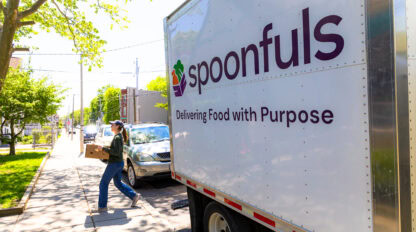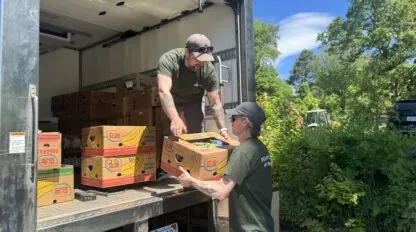More than just temperatures rise during the summer, so do rates of food insecurity

By Sean Ahern, Spoonfuls’ Senior Director of Operations
Even when the world piles on problems like Covid, the supply chain, and inflation, we know pre-existing issues, like hunger, don’t magically disappear. According to Feeding America, 12 million children in the U.S. are facing food insecurity right now. In Massachusetts alone, Project Bread estimates 1 in 5 households with children are food insecure as of March 2022, while systematically vulnerable populations experience even higher levels of food insecurity. These staggering numbers are even more concerning during the summer months when children have less access to food sources they relied on at school throughout the year. This decrease in children’s access to food is known as the “summer meals gap.”
School meal programs are a great solution for tackling childhood food insecurity when class is in session, but other tools are needed to minimize the meal gap when schools close, particularly for the summer months. Food programs across the state work tirelessly to fill the gap. One example: The Summer Food Service Program (SFSP), known as Summer Eats in Massachusetts, a federally funded program run by the Department of Elementary and Secondary Education (DESE) and Project Bread, which works to provide children with meals throughout the summer months. Through this work from school districts, nonprofits, and community-led initiatives, meals are available for families throughout the summer months.
Yet, despite these efforts, not everyone who can participate in the SFSP does often due to even seemingly simple pieces of the puzzle, like transportation, which becomes a limiting factor when it isn’t easily available or accessible. According to the Food Resource & Action Center (FRAC), only one in seven children who accessed a free or reduced-price school lunch during the 2018-2019 school year were reached by summer nutrition programs in July 2019, the latest summer for which data is available.
Food insecurity is a major public health threat for all, but especially so for growing kids. Research shows that reliable and consistent access to nutritious foods in childhood helps childhood brain development, improves academic performance and emotional well-being, and reduces obesity, high blood pressure, and diabetes. In Massachusetts alone, it affects over half a million people, with more vulnerable populations experiencing food insecurity at even higher levels. Nearly 1 in 3 Black and 1 in 4 Latinx households with children are food insecure. The short and long-term effects of the Covid-19 pandemic, as well as recent economic turbulence, have only increased uncertainty around where people’s next meals will come from. Add in the summer meals gap and countless families around the state will be facing yet another hurdle in the coming months.
So what can you do to support food access for kids during summer and beyond?
Share resources with your network and community!
Ask what your local school dining services are doing for summer meals in your community and share that information with your neighbors. Spread the word about all Summer Eats sites in Massachusetts, too.
Volunteer at your local food pantry or meal program!
Spoonfuls works with over 185 nonprofit beneficiaries, many of whom are Summer Eats sites and some of whom welcome volunteers. Look for an organization close to you and reach out to see how you could help!
Learn more and advocate for lasting change. School Meals for All legislation (S314/H714) is a proposed bill that would make universal free school meals available statewide. Get involved with this great advocacy work Project Bread is doing here!


